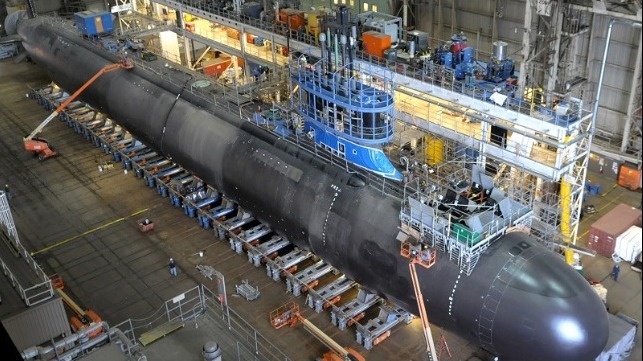Metallurgist Pleads Guilty to Faking Tests on U.S. Nuclear-Sub Steel

The former director of metallurgy for the U.S. Navy's top supplier of high-yield steel for submarine castings has pleaded guilty to falsifying test results that measured the strength and toughness of her company's products.
Elaine Thomas, 67, has pleaded guilty to the charge of major fraud on the United States. Sentencing is scheduled for next February, and she faces up to 10 years in prison and a $1 million fine.
Her former employer, Bradken Inc., was the U.S. Navy’s leading supplier of high-yield steel castings for submarine construction. In 2008, the company acquired a Tacoma foundry that makes the castings that the Navy's two prime contractors use to make submarine hulls. Given the extreme performance and reliability demands for nuclear submarines, the Navy requires that the steel meets standards for strength and toughness.
Thomas, as the Tacoma foundry's director of metallurgy, has admitted that she falsified results to hide the fact that the steel had failed the tests. According to charging documents, Thomas faked the results for over 240 batches of HY-80 and HY-100 steel, covering a "substantial percentage" of the castings that the foundry produced for the Navy from 1985 to 2017. According to Bradken, this pattern of fraud resulted in the installation of "hundreds of substandard castings on Navy vessels" built by General Dynamics Electric Boat and Huntington Ingalls Industries.
Prosecutors say that Bradken's management was not aware of the fraudulent test results until May 2017, when a new lab manager took over the role and reported that Thomas' test cards appeared to have been systematically altered. The new manager also found two sets of books: one for accurate results, and a second for the fraudulent, passing, results reported to the customer.
Bradken immediately notified the Navy, but the company's initial statements "minimized the evidence that the employee had engaged in deliberate fraud, and downplayed the possibility that the fraud was as broad in scope as we now know it was," the firm has admitted. In response, federal investigators came in to comb the company's records and discovered evidence of fraud going back to the 1980s. Prosecutors ultimately decided to charge Bradken with major fraud against the United States.

that matters most
Get the latest maritime news delivered to your inbox daily.
In 2020, Bradken it entered into a deferred prosecution agreement, enacting changes in its testing and compliance program and paying a civil settlement of about $11 million. If Bradken complies with the agreement, the government will dismiss the charge against the company in 2023.
In addition to safety issues created by the fraud, the cost to the federal government is considerable, prosecutors said. The U.S. Navy has taken extensive steps to remediate the potential risk of the substandard parts, resulting in increased costs for monitoring and maintenance.
